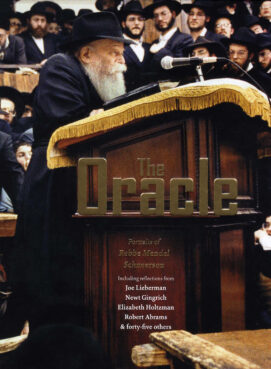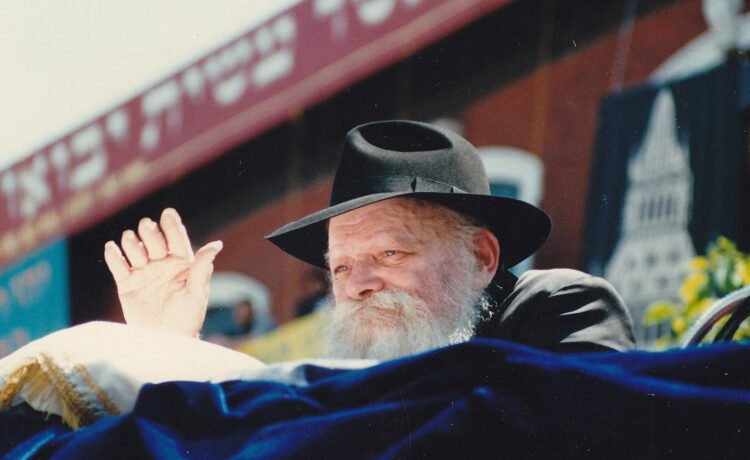(RNS) — Last summer, to mark the 30th anniversary of the death of Lubavitcher Rebbe Menachem Schneerson, photographer Marc Asnin and writer Dovid Zaklikowsky published “The Oracle,” a handsome volume featuring a large array of photos and interviews of 50 followers and a few prominent outsiders who knew the man who presided for decades over the Hasidic sect known as Chabad. The recollections are personal, circumstantial and not lacking in hagiographic appreciation.
A sampling: “Conversations with the Rebbe were always fascinating.” “Even now his message, his teaching, and his influence grow stronger every day.” “I would add that every physical action of the Rebbe’s was also replete with spiritual meaning.” “The Rebbe’s words live with me every single day.” “His work and accomplishment are not just monumental, but eternal.” And so on.
Asnin’s images create an indelible portrait of devotees, of the world they inhabit in Crown Heights, Brooklyn, and of the Rebbe himself, photographed in conversation and at prayer, alone and from the pulpit, for a New York Times Magazine article, “The Oracle of Crown Heights,” two years before he died. Altogether, it would seem to be a coffee table book for the devout and for the many not-so-devout Jews who have benefited from Chabad through the determined outreach effort that has been the Hasidic sect’s central mission for half a century.
But there’s a problem. One of the interviews is with Allan Nadler, an Orthodox rabbi and retired professor of Jewish studies who had been introduced to the Rebbe as a teenager and came away singularly unimpressed. “I saw a guy who was selling me a slogan,” he said. As for the Rebbe’s acolytes, he recalled going home and telling his father, “It was like being with Moonies. His followers look like zombies.”

“The Oracle: Portraits of Rebbe Mendel Schneerson” (Courtesy image)
To make matters worse, Nadler has been a bit of a thorn in Chabad’s side. In 1990, he wrote an op-ed for The New York Times arguing that the Rebbe should stop trying to influence politics in Israel — in this case, by opposing the formation of a Labor Party government based on his conviction that returning even an inch of “holy territory” to “heathens” would violate rabbinic law. Covering the Rebbe’s funeral for the New Republic, Nadler criticized the sect for its messianism, most importantly for the conviction of many Chabad members that the Rebbe was himself the Messiah — a belief he termed “Christological.”
“Is this the book with Allan Nadler?” said the Chabad rabbi in Beijing, Shimon Freudlich, according to posts on social media after “The Oracle” appeared. “Why would anyone buy this book let alone give it to anyone as a gift? This is the most disrespectful gift I’ve ever heard of … BURN IT!”
“We are talking about a dirty article, full of venom and hatred,” Yosef Greenberg, the Chabad rabbi in Anchorage, Alaska, and one of the most prominent leaders of the movement today, wrote similarly. “We need to burn all the books, and burn Nadler, and all those who had the audacity to cooperate with it!”
The attacks, amounting to a herem, or religious censure, echoed across Chabad’s WhatsApp networks. Shops in Crown Heights were told not to stock the book.
One might ask why Asnin and Zaklikowsky, whose own admiration for the Rebbe is considerable, chose to include an interview with Nadler. The answer lies with Zaklikowsky, a lifelong Chabad member who nevertheless marches to the beat of his own drummer. In a community of wall-to-wall Trumpists, he votes for Democrats. In a world that has accorded the Rebbe prophetic status, he is not afraid to note his failings — such as his failure to have Chabad stay close to its Hasidic roots and to limit the role of alcohol in its culture.
Above all, Zaklikowsky practices a journalistic devotion to God’s desire for “truth in the inward parts,” as the Psalmist puts it, and that meant including one of the Rebbe’s critics.
“I never hide anything,” he said in an interview. “I’m a truth seeker. A lot of people in Chabad are in public relations mode all the time. This is not what I’m ever going to do.”
Asnin, for his part, is a non-Chabad Jew who admires the Rebbe and disagrees with Nadler but does not let that stand in the way of his commitment to free expression. “It’s hypocritical that someone in their community can’t publish something that says someone didn’t love the rebbe,” he says.
Among those who denounced “The Oracle” when it came out was Chaim Dalfin, a Chabad rabbi, author and podcaster who asked, “Why would (Zaklikowsky) allow an article from — I’m going to use a harsh word — a Rebbe-hater, Allan Nadler, to be published?” As for Nadler, he should do teshuvah — repent — for what he said and “consider a public apology.”
Dalfin subsequently backtracked, doing a series of podcasts with Asnin during which he said he disagreed with the rabbis who called for burning and banning the book. “This is not Jewish, this is not Chabad, and this is not the Rebbe,” he said.
Dalfin also interviewed Nadler, apologizing for calling him a Rebbe-hater and saying that calls for the book and for him to be burned were unacceptable. “The Rebbe is looking down from on heaven and is very upset about his Hasidim speaking this way,” he said. (Not that he didn’t try to get Nadler to apologize.)
But for Zaklikowsky, the Chabad Hasid, there was neither podcast nor apology.
“Dalfin apologizes to Nadler and Marc,” he said. “I can’t be forgiven. Because in their mind I’m not allowed to think for myself.”
You Might Also Like
New book calls for authentic engagement and equity in organizations
The Nine Asks by Kimberly Danielle Organizations have a responsibility to ensure that people who come there to work, worship,...
‘Holy Hurt’ is Hillary McBride’s field guide to the shattering impact of spiritual trauma
(RNS) — Trauma is a lot like having a shard of glass in your hand, explains clinical psychologist Hillary McBride....
So You Married a Priest? + Beth Allison Barr
It’s ministry by marriage. Did you know there are piles of guidebooks meant to help women excel at...
Abyssinian Baptist Church welcomes dismissal of pastor candidate’s discrimination suit
(RNS) — A federal judge has dismissed a gender discrimination lawsuit brought against Abyssinian Baptist Church by a onetime candidate...










